By Rob Simbeck
Call it buzz. Call it sizzle. Call it Music City mojo. By almost any measure, Nashville is an It City. Publications from The New York Times to GQ, Southern Living to Rolling Stone, and Bon Appetit to Business Insider have sung its praises.
Our branding may still have country music at its core (and given the long, loving establishment shots airing weekly on the ABC series that bears its name, who’s complaining?), but it now includes professional sports, the health care and automotive industries, world-class education, fine dining, upscale downtown living, and an explosion of entrepreneurship.
Combine those with a reputation for safety and civility, and you’ve got everything any convention and visitors bureau might want. “We have all the assets of a growing, vibrant city,” says Country Music Association CEO Sarah Trahern, EMBA’04, “and we’ve been able to hold onto the intimate business environment we had before.”

Revitalized shops and restaurants along historic Broadway reflect in a panoramic view of new growth in downtown Nashville. Photo by: John Russell
Owen Dean Eric Johnson, who returned to the city after 14 years at Dartmouth College, says the changes were almost like Rip Van Winkle falling asleep. “In coming back, everything was dramatically different,” he says. He cites the Nashville Predators and Tennessee Titans, both of which began play in Nashville in 1998, as well as the Schermerhorn Symphony Center, opening five years later, as among the keys to a re-emergent downtown. The 1994 lifting of a ban on most downtown residential development contributed to transformations like that of 12 South, which Johnson saw go from “a pretty unsavory place” into “the hottest, coolest thing ever.”
Johnson came back to a business school whose people and programs are an integral part of the city’s transformation. After all, while affordability, climate, far-sighted governance, and attractiveness to a young, upscale demographic all play a part, a great business climate is crucial. A recent Gallup poll ranked Nashville in the nation’s top five metro areas for job growth, and CNN Money called it one of the five “best cities to launch a startup.”
Nation’s health care manager
A key component is health care, and there are few stronger examples of synergy than Bernard Health, conceived by Alex Tobert, JD/MBA’07, in a health law class. The Nashville-based company offers health care planning and advice to individuals and corporations.

Alex Tolbert, JD/MBA’07, combined two of Nashville’s strengths, health care and entrepreneurship when he founded Bernard Health.
Attracted to the city while visiting his brother, who attended Vanderbilt, Tolbert “got really passionate about the misalignments in health care” while at Owen. He focused on health savings accounts, and when someone asked how he could start a business without raising initial outside capital, “I said I would get my insurance brokerage license and start calling on employers in Nashville to help them understand how HSAs might work for them and their employees,” he says. Bernard became a reality during his last year at Vanderbilt, and he is quick to praise the school’s atmosphere.
“I don’t think it should be discounted, having an environment that really encourages entrepreneurship and experimentation,” he says, “and having cheerleaders among the professors, who bring students together with entrepreneurs who tell stories about how they did it. That’s a really big deal.”
The Nashville area is home to more than 300 health care companies that extend the city’s reach nationwide, Johnson says. The dean, who also is the Ralph Owen Dean and Bruce D. Henderson Professor of Strategy, says, “Many cities have world-class health care, but what’s really different about Nashville is that we’ve become a city that manages health care for the whole country, in a quiet way that the average person in Columbus or Kansas City really wouldn’t think about.”
Health care strategy is a must for businesses and individuals alike, and the Owen School’s role in preparing industry leaders since launching its Health Care MBA in 2005 makes it a key player.
“We fundamentally believe that health care has become a topic that’s important for all managers to understand,” Johnson says. “Whether you work at GE, Exxon, or Amazon, you’ve got to know something about it because the health care equation in the U.S. and what it means for corporate America is changing.
The industry’s reach and buzz help feed Nashville’s attractiveness to the best minds, Tolbert says. “Interesting people like to work on interesting problems. We’re attracting and keeping people here, and I like to think our growth and success are a good thing for Nashville.”
Power of connectedness
The possibilities of a wider back-and-forth between industries are part of the approach of Van Tucker, EMBA’96, a consulting strategist and entrepreneur with a background in banking and finance. She’s now CEO of Fierce Company, which helps creative companies build business infrastructure around their products or ideas. “The CEO of a young clothing company can learn from a health care CEO running a multimillion-dollar company,” she says, “and that health care executive can learn from that young clothing company about connectedness and authenticity.”
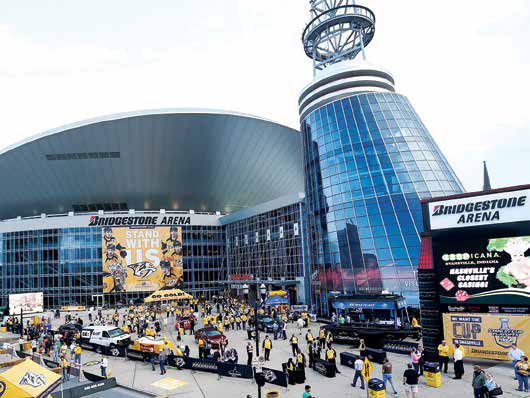
Nashville now has two major league sports teams. The Nashville Predators brought the 2015 Stanley Cup Playoffs to the Bridgestone Arena.
Tucker is also CEO of the Nashville Fashion Alliance, a trade association for the city’s burgeoning fashion industry—an industry driven by the city’s attractiveness to young, educated professionals. She cites yet another example of synergy in the way the group draws inspiration from the music industry.
“In the 1950s, entrepreneurial visionaries like Owen and Harold Bradley and Chet Atkins believed the creative spirit could be nurtured in Nashville and an industry outside the chaos of New York and Los Angeles could thrive,” she says. “They started publishing companies, world-class recording studios, record labels, the CMA. We’re the largest concentration of music industry jobs in the U.S. because of their vision. That’s our vision for the Nashville Fashion Alliance—to nurture the infrastructure necessary to support and sustain fashion industry companies.”
Business and music
The CMA’s Trahern can attest to the success of the Bradley/Atkins model. Nashville’s history as a seat of government and education goes back to the 19th century, but country music is the foundation of its reputation.

Sarah Trahern, EMBA’04, says the tie between business and the music industry is one of Nashville’s strong points.
While the economics are tricky in an era of downloading, the brand has never been stronger. The genre is played on 2,200 radio stations, and the CMA’s three major network television specials get great ratings. Those, along with the series Nashville and the presence of Blake Shelton and Keith Urban on The Voice and American Idol, respectively, all contribute to the city’s image. Extending that reach is among Trahern’s main goals.
“I love being able to spend time anchoring the CMA and country music into the fabric of the community as a whole,” says Trahern, who is also a board member of the Monroe Carell Jr. Children’s Hospital at Vanderbilt. She cites the work of Dr. Jeff Balser, Vice Chancellor for Health Affairs and Dean of the School of Medicine and Vanderbilt Medical Center in helping the CMA create Instrumental Health Care, which gives musicians and songwriters the opportunity to get health insurance.
“That town-and-gown kind of thing, unique strategic partnerships is a Nashville strong point,” she says. “What’s more, banks support Music Row No. 1 parties, and the CMA has, in turn, created our foundation and given over $8 million dollars to get instruments back in Metro schools. It’s a way we give back to the community that’s given so much to us.”
Success draws talent
Like Tucker, Vic Gatto, MBA’02, CEO of Jumpstart Foundry, a health care business accelerator, and a partner in Solidus, an investment partnership, sees the city’s future in youth and creativity—places where Vanderbilt is well-positioned.
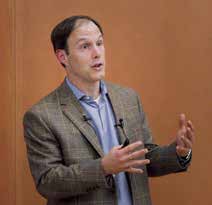
Nashville’s mix of creative talent,
established industries and capital sources make it attractive to startups, says Vic Gatto, MBA’02.
“Nashville is the place every talented, highly mobile person wants to move to these days,” he says. “I think startups also migrate to where the ecosystem is most conducive to success. In Nashville, we have a very strong mix of creative talent, established industries, and capital sources. While it is likely true that San Francisco and New York have more assets, Nashville has grown to be in the next tier of three or four cities that are slightly smaller and friendlier but almost as supportive of startup companies.”
The city has, in fact, reached a point of critical mass, he says. “All of this talent flowing into our city creates a self-fulfilling dynamic in which great startups are able to hire very strong people, have success, and then attract more talent into Nashville.”
It’s a dynamic that established companies appreciate as well. Bridgestone Americas, long a Nashville presence, announced last November that it would relocate its headquarters and move three out-of-state businesses to a new facility downtown, ultimately installing more than 1,700 employees in the vibrant, growing SoBro district. “The fact that many bright, capable professionals call Nashville home is an

Is Nashville the new auto capital of the country? Ask Jennifer Hill, EMBA’15, who works as a process engineering manager at the Nissan Smyrna assembly plant. In 2006, Nissan moved its U.S. headquarters to the Nashville area.
advantage as we look to expand our workforce and recruit new talent across all of our business lines and support functions,” says Andrew Honeybone, MBA’04, the company’s vice president of talent acquisition. “Between now and the end of 2017 when we move into our new headquarters, we will be filling several hundred professional positions, so having an educated talent pool locally is very beneficial to our overall recruiting efforts and long-term talent strategy.”
It helps that so many regional firms weave themselves into the structure of secondary and post-secondary education. Jennifer Hill, a 2015 MBA for Executives graduate, is a manager of process control engineering at Nissan North America in Smyrna, Tennessee. Hill is adamant about reaching out, particularly to young women and encouraging STEM careers. “I am fortunate to work for a company that supports the ecosystem of fostering good talent,” she says. “I believe Nissan understands it is important to start in the community and influence the upcoming generation.” The It City appellation is one that resonates strongly with her.
“It’s well-deserved,” she says. “I am a firm believer in the power of diversity, and that is an essential characteristic of Nashville. Focusing on higher learning initiatives and career opportunities is essential to the city’s success, and we are on the right track.”
Absolutely on fire
The confluence of industry and culture and the influx of people that make Nashville a truly multidimensional and rapidly growing city provides challenges along with the opportunities.
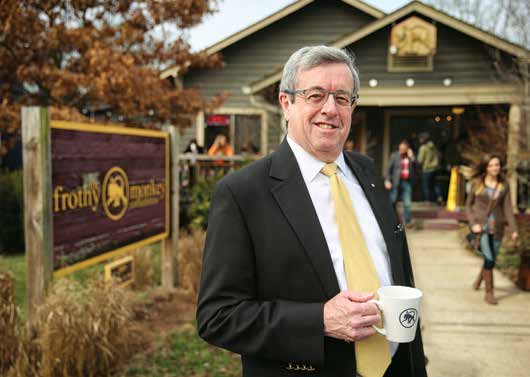
Veteran hospitality entrepreneur Rich May, EMBA’87, is an investing partner, consultant, and adviser in local coffeehouse Frothy Monkey and other restaurants in the region.
“For the hospitality industry, it’s a challenge to keep up with the growth,” says Rich May, EMBA’87, a food, and hospitality consultant and investor whose M Street Entertainment and JHS Holdings represent some of the city’s best local restaurants, including Amerigo, Frothy Monkey, Whiskey Kitchen, and Virago. “Although the market invariably finds equilibrium over the longer term, the pool of entrepreneurs is absolutely on fire.”
May says that will abate somewhat as the hit rate inevitably subsides, but “it currently provides a refreshing and invigorating jolt of life to the city’s growth and reputation.” Helping companies negotiate those challenges is something Johnson sees as a clear part of Owen’s role. “We see tremendous opportunity partnering with companies to supply their management needs,” he says.
He points to the Nashville Entrepreneur Center as a great vehicle to build the school’s entrepreneurship offering. “In a uniquely Nashville way, we do a very good job of partnering with the venture community, the startup community, and many of the large companies in town to build a great ecosystem our students can participate in,” he says. He cites, too, the school’s immersive experiences, “where MBA students may spend a week on Wall Street, or in surgery suites or insurance companies, gaining a thorough understanding of what the business means where the rubber hits the road.”
Organizations like the Nashville Health Care Council’s Fellows Program, Leadership Music, and Leadership Nashville provide educational and networking opportunities, and Johnson says, “really leverage the strengths of what’s here in Nashville and enable us to fight way above our weight class as a city.” The ties between Owen, the city, and the wide-ranging industries and demographics that comprise it seem to undergird the sound basics behind Nashville’s image.
“Cool is fleeting,” Tucker says. “Well-run businesses stick around and have a sustainable economic impact. Someone said to me recently that the thing about being an It City is that you have to keep coming up with ‘Itness.’ I’m proud of all of the press Nashville is garnering, and it’s certainly warranted, but the real quality has always been the genuineness and connectedness we all share to make Nashville a great place to live and work.”
May echoes her words. “Owen is neither the largest nor the oldest B-school out there, but it may very well be among the most tightly knit,” he says. “Its conscious effort to promote and maintain engagement augurs well for both the school and the city.”
Tolbert says he’s extremely bullish on Nashville. “We’ve got so much going for us, and I think our motto at this point ought to be, ‘Just don’t screw it up.’”
Nashville Then and Now
Looking back, it’s hard to remember what Nashville was like a few decades back. Here’s a refresher course.
1970’s
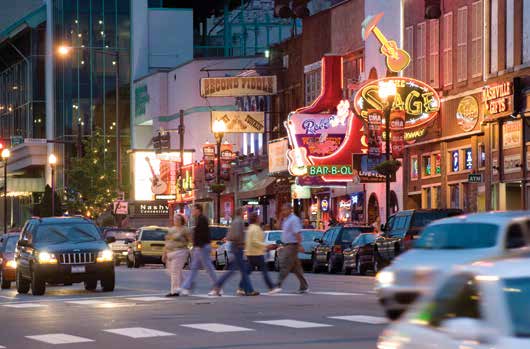
Broadway
Nighttime messages spelled out in the Tennessee Tower’s windows delight. Maude’s Courtyard, Jimmy Kelly’s, and the Stockyard lead the power lunch brigade. Popular gathering spots include Pancake Pantry, Lums, TGI Fridays, The Villager, Spats, Mack’s and Candyland/Vandyland. Pro baseball comes to Nashville with the new Nashville Sounds farm team in the spanking new Herschel Greer Stadium. East Nashville? No one goes there.
1980’s
Lower Broadway has seen better days. There’s talk of tearing down the Ryman Auditorium. Strip bars and tacky tourist shops flourish along Lower Broadway. See and be seen at Arthur’s and Houston’s. The Cooker and IHOP are standards, and San Antonio Taco Company makes its debut. Singer-songwriters ply their trade at The Bluebird Cafe.
1990’s
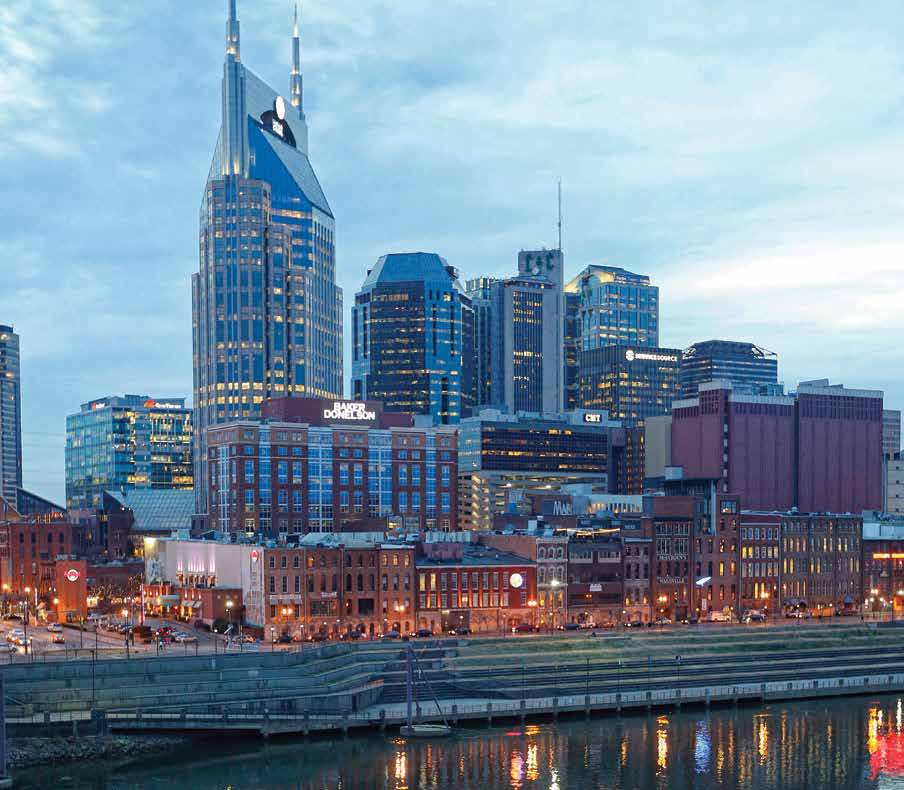
Nashville Skyline
The Batman Building rises, making Nashville’s skyline unmistakable. The restored Ryman reopens and sees The Boss, Elvis Costello, and a legion of country stars take the stage as Lower Broadway begins its renaissance. Sunset Grille quickly becomes a Hillsboro Village fixture. Doubters shake their heads as the NHL Nashville Predators arrive, and the Houston Oilers relocate to Nashville.
2000’s
Sylvan Park, East Nashville and 12South are the hot new neighborhoods. The Bound’ry and Mirror top the list of popular spots. The acoustically excellent Schermerhorn Symphony Center opens south of Broadway, sparking that area’s revival. The Music City Miracle advances the Tennessee Titans into the playoffs and the Super Bowl.
TODAY
The new Music City Center now anchors SoBro. Cranes all over town speak to the construction boom. The city is an eater’s paradise—chefs at Husk, City House, Rolf and Daughters, and Catbird Seat win national acclaim. Locals find reservations have become a must. The Predators make the playoffs, the Titans take a Heisman-winning QB in the first round and the Sounds christen a new downtown baseball stadium. Some things never change. SATCO and Pancake Pantry still draws lines. The Bluebird, a prominent feature of the Nashville TV show, is still the place to hear music.
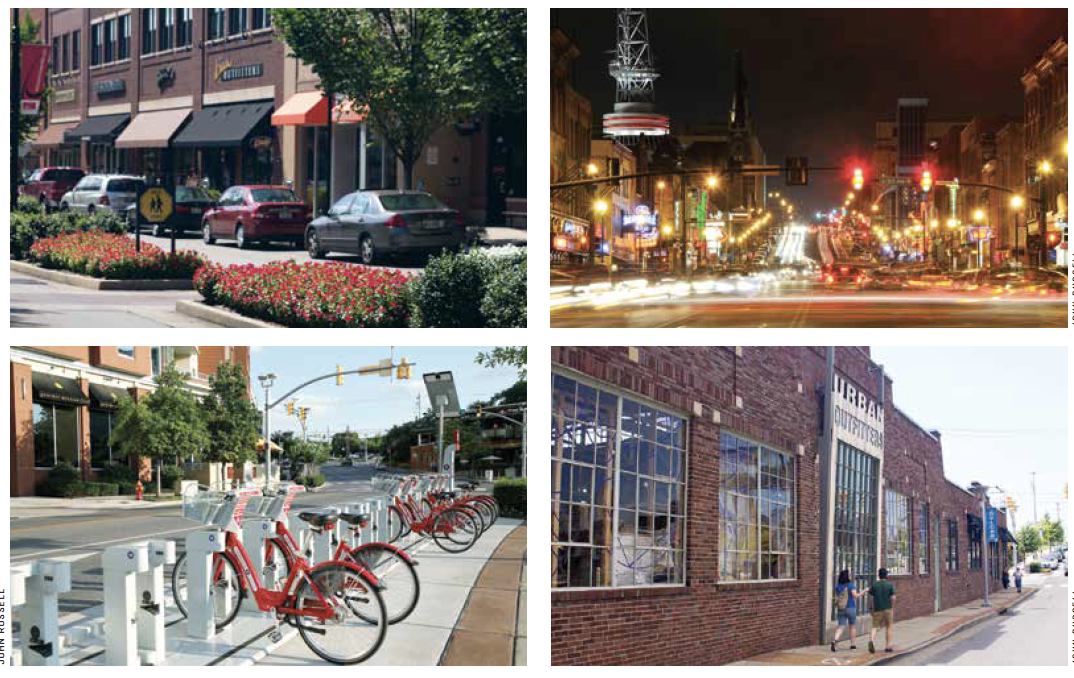
Clockwise from top left: Hill Center Green Hills was one of the area’s first mixed-use projects. It combines retail, dining and office space with an
emphasis on walkability and neighborhood culture. The neon lights are bright on Broadway. The once avoided area bustles with activity almost 24/7. High-rises, restaurants and eclectic shopping thrive in the area known as the Gulch. One alternative to downtown traffic and parking rates is B-cycle Bikes, a bike-share system.